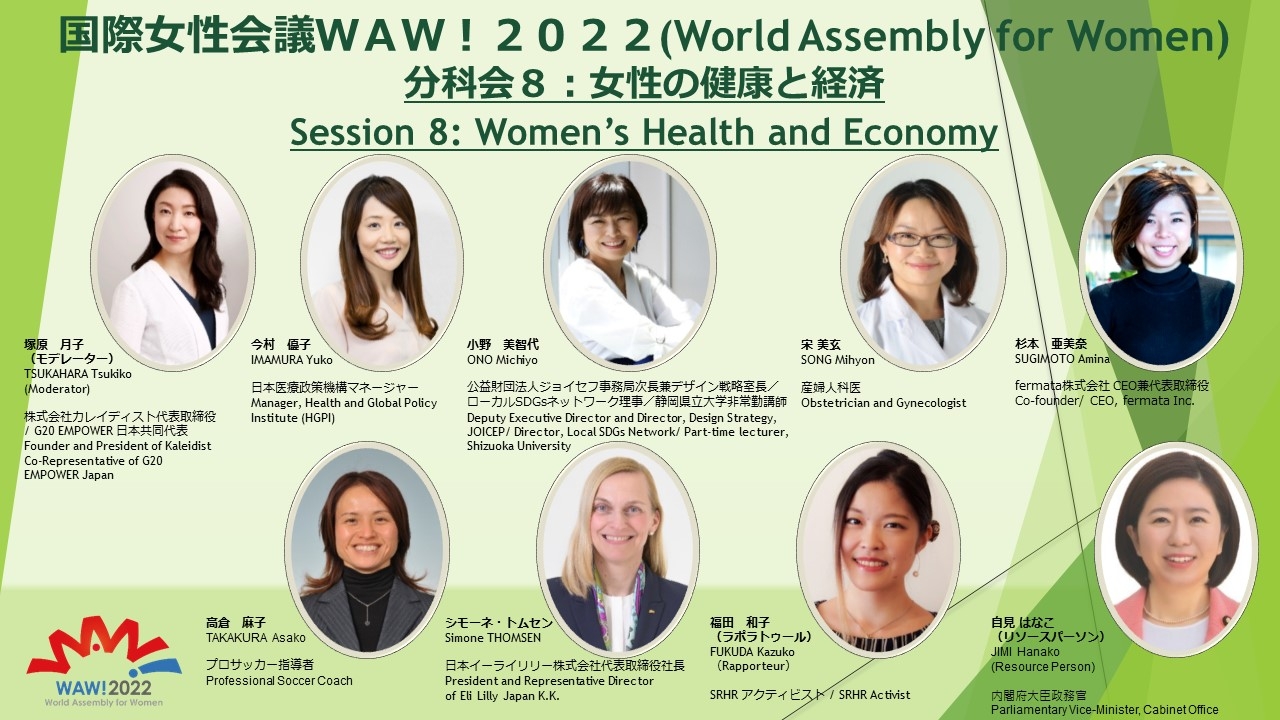Women's Empowerment and Gender Equality
World Assembly for Women: WAW! 2022
Concept Note
Women’s Health and Economy
Participants

- TSUKAHARA Tsukiko, Founder and President of Kaleidist/ Co-Representative of G20 EMPOWER Japan (Moderator)
- IMAMURA Yuko, Manager, Health and Global Policy Institute (HGPI)
- ONO Michiyo, Deputy Executive Director and Director, Design Strategy, JOICEP/ Director, Local SDGs Network/ Part-time lecturer, Shizuoka University
- SONG Mihyon, Obstetrician and Gynecologist
- SUGIMOTO Amina, Co-founder/ CEO, fermata Inc.
- TAKAKURA Asako, Professional Soccer Coach
- Simone THOMSEN, President and Representative Director of Eli Lilly Japan K.K.
- FUKUDA Kazuko, SRHR Activist (Rapporteur)
- JIMI Hanako, Parliamentary Vice-Minister, Cabinet Office, Japan (Resource Person)
Current situation and challenges to be discussed
Why is it beneficial for societies and economies to consider women's health?
According to the United Nations Population Fund (UNFPA), one in four people in the Asia-Pacific region will be 60 or older by 2050, and most of them will be women(note1). In Japan, half of all women are expected to live to be over 90 years old, making their experience the epitome of the "100-Year Life"(note2).
At the same time, in Japan, it is estimated that the annual economic burden to society due to labor losses and the cost of medical supplies and hospital visits resulting from menstruation and other women’s and girls’ health issues amounts to approximately 700 billion yen(note3). In addition, many women find it challenging to balance fertility treatment and work(note4). Given the current aging society with low fertility, giving up fertility treatment or work could have a negative impact on social and economic development. Some women also have given up their career paths to become executives due to pregnancy, childbirth, or menopause.
Femtech, a term that combines the words ‘female’ and ‘technology’, has been attracting attention around the world in recent years. Investment is gradually increasing in this field with the aim of solving health issues specific to women, who account for half of the world's population(note5). Coupled with this investment, support from companies and local governments is also essential to solving women’s health issues.
The life events and mental and physical health challenges faced by women are not specific to women. As research on women's menopause and hormones continues to advance, it has been found that men can also experience menopausal symptoms. Furthermore, female hormones are beginning to be used as an effective treatment for prostate cancer. It is also hoped that knowing and caring about women's health issues will improve overall workplace management to be more responsive to diversity.
Thus, taking into consideration women's health leads to the creation of a society in which, not only women, can live easily and work healthily. Human rights issues, including women's rights, are important issues that contribute to economic development.
Discussion Topics
- With the trends of low fertility and aging population, and given that health issues specific to women become known worldwide, what initiatives are meaningful to ensure women who hope to play an active role in society can fully contribute to society and the economy? What are some good examples from other countries?
- What kind of environment is necessary to raise awareness of health issues specific to women so that they do not bear those issues alone? What can governments, companies, and communities do to address these issues?
- What technologies have been developed with consideration for women's health? What are their impacts not only on women's health but also on society and the economy as a whole?
- (note1) 朝日新聞DIGITAL、“高齢化対応に必要なのは女性の人生のあらゆるステージへの支援だ 国際高齢者デーに寄せて”
 (Japanese)
(Japanese) - (note2) 内閣府男女共同参画局、“令和4年版男女共同参画白書” (PDF)
 (Japanese)
(Japanese) - (note3) Tanaka E, et al (2013) “Burden of menstrual symptoms in Japanese women: results from a survey-based study” Journal of Medical Economics, 16(11), 1255-66

- (note4) 厚生労働省、“不妊治療と仕事の両立に係る諸問題についての総合的調査” (PDF)
 (Japanese)
(Japanese) - (note5) 経済産業省、“政策特集フェムテックで企業が変わる、社会が変わる。vol.1 一人ひとりが輝ける社会をいかにつくっていくか そのための条件とは”
 (Japanese)
(Japanese)

